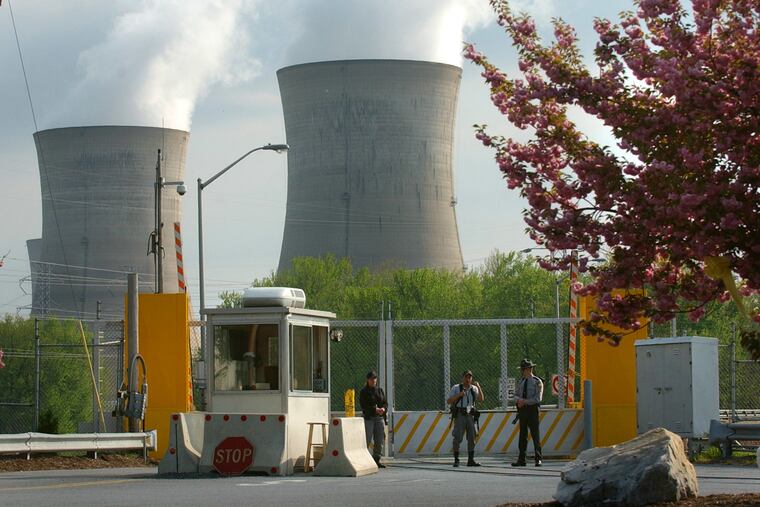Ed Rendell: I wish I’d made different choices about nuclear power in Pa. | Opinion
The former governor says if he knew in 2004 what he knows now about global warming and climate change, he'd have included nuclear power as a qualifying energy resource under the Alternative Energy Portfolio Standards.

The adage “hindsight is 20/20” often applies to politics. Especially when a career in public service spans as many years as mine. It means it’s easy to know the right thing to do after something has happened, but it is hard to predict the future. I liked to think I could predict the future during my years as governor. And I think I got more things right than I did wrong. However, if I could turn back the clock, I’d have made some different choices as it relates to Pennsylvania’s nuclear power plants and their unique ability to protect against climate change.
Back in 2004, we passed a law in Pennsylvania called the Alternative Energy Portfolio Standards, or AEPS. I was a leading proponent of AEPS inasmuch as it was designed to achieve two important policy goals of my administration: first, to establish Pennsylvania as a leader in alternative energy sources and therefore promote economic development and job creation in the commonwealth, and second, to help Pennsylvania lead the way in environmental stewardship by reducing the commonwealth’s reliance on fossil fuels and thus reducing Pennsylvania’s greenhouse gas emissions.
Fifteen years later, I am proud that the goals of the AEPS program have been and continue to be achieved. AEPS has resulted in creating and sustaining thousands of jobs and business ventures associated with all aspects of renewable and alternative energy generation.
In 2017, approximately 52 megawatts (MW) of solar-electric generating capacity was installed in Pennsylvania, which brought the in-state total capacity to 285 MW. These installations helped sustain a Pennsylvania workforce of just over 3,800 people who are engaged in all aspects of the solar industry. Job growth in this sector increased 26 percent from 2016.
Pennsylvania also supports a significant number of wind energy jobs. In 2016, the American Wind Energy Association reported the total number of direct and indirect jobs supporting the wind industry in Pennsylvania was approximately 1,656. This included jobs at 27 in-state manufacturing facilities.
Pennsylvania has significant hydropower generating capacity as well. According to the National Hydropower Association, approximately 325 Pennsylvania businesses are part of the hydropower supply chain.
Nevertheless, while Pennsylvania is to be commended for all that we have achieved through AEPS in the promotion of carbon-free energy for the commonwealth, it is simply not enough – much remains to be done. I therefore encourage the General Assembly to be more aggressive in promoting further development of renewables: solar, wind, and hydro.
Alarmingly, what we have accomplished through AEPS so far is now at great risk of effectively being wiped out if the state’s nuclear power plants begin to shut down. Pennsylvania’s nuclear power plants generate 93 percent of our state’s carbon-free energy and 13 times more electricity than wind, solar, and hydropower combined. In fact, losing the Beaver Valley and Three Mile Island plants alone will negate five times the emission benefits of all the solar and wind power projects installed in Pennsylvania to date.
Here is what I know to be true: The world is on course to reach the limit of tolerable warming in the next 20 to 25 years; nuclear power has a crucial role in climate protection, accounting for almost 60 percent of emissions-free power in the U.S.; when nuclear plants close, they are most often replaced by fossil fuels; and revising energy portfolio standards to stop utilities switching from nuclear to fossil fuels must be on the table as the world wakes up to the role nuclear power must play in avoiding a climate catastrophe.
Pennsylvania’s Nuclear Energy Caucus recently reported, “Closing Pennsylvania’s nuclear plants will increase carbon dioxide emissions by more than 37 million metric tons, along with increased emissions of sulfur dioxide, nitrogen dioxide and small particulates harmful to air quality.” Davitt Woodwell, president of the Pennsylvania Environmental Council, put it this way: “The loss of today’s nuclear fleet would be a terrible blow to the progress already made in reducing Pennsylvania’s contribution to climate change and would hamstring all of our combined efforts.”
As in the case of solar, wind, and hydropower, nuclear clearly provides an important environmental benefit to the citizens of our commonwealth: energy that does not create greenhouse gas emissions and does not exacerbate the troubling changes to our climate that are clearly occurring. Hence, nuclear power should be rewarded in a similar fashion. It is the logical and right thing to do.
So when it comes to hindsight being 20/20, if I knew in 2004 what I know now about global warming and climate change, I would have certainly included nuclear power as a qualifying energy resource under AEPS. Accordingly, on behalf of our children, our grandchildren and all of Pennsylvania’s citizens – today and in the future – I urge lawmakers and Gov. Wolf to support legislation to amend AEPS and properly value the role of nuclear power as Pennsylvania’s largest carbon-free energy source.
Ed Rendell, the 45th governor of Pennsylvania, is special counsel at the law firm Ballard Spahr LLP. Exelon Generation LLC, which operates nuclear power plants in Pennsylvania, is a client of the firm.